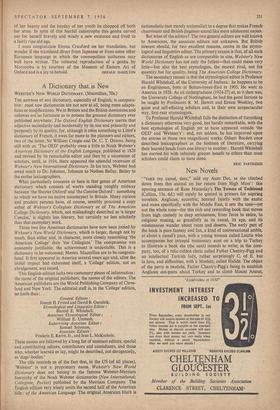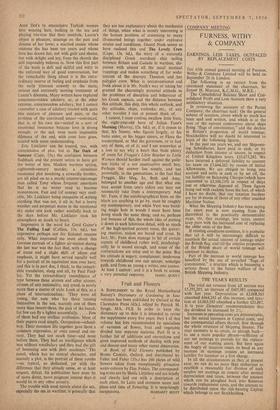New Novels
"'TAKE my camel, dear," said my Aunt Dot, as she climbed down from this animal on her return from High Mass' : this opening sentence of Rose Macaulay's The Towers of Trebizond (Collins, 13s. 6d.) will surely be quoted in primers for aspiring novelists. Anglican, eccentric, scented faintly with the exotic and more specifically with the Middle East, it sets the tone—yet not the whole tone—for this rich and rewarding book that moves from high comedy to deep seriousness, from farce to satire, to religious musing, as gracefully as its camel, its ape, and its missionaries wander about ruins and deserts. The early part of the book is pure fantasy and fun, a kind of conversational amble, at about a camel's pace, with a young woman called Laurie who accompanies her intrepid missionary aunt on a trip to Turkey to illustrate a book she (the aunt) intends to write; in the com- pany, too, of a relic-ridden cleric called Father Chantry-Pigg and an intellectual Turkish lady, rather surprisingly C. of E. but in love, and difficulties, with a Moslem, called Halide. The object of the party is twofold, Father Chantry-Pigg's being to establish Anglican out-posts about Turkey and to climb Mount Ararat,
Aunt Dot's to emancipate Turkish women into wearing hats, bathing in the sea and playing tric-trac like their menfolk. Laurie's object is pleasure, musings on the past and dreams of her lover, a married cousin whose mistress she has been ten years and whose love has drawn her, not with guilt and shame. but with delight and joy, from the church she still impossibly believes in. Now this first part of the book is deft and skilful and witty in the unforced way of good conversation, but the remarkable thing about it is the extra- ordinary swerve of feeling and emphasis from the early itinerant comedy to the static, serious and extremely moving treatment of Laurie's dilemma. Many writers have explored conscience-ridden adultery, or, at the other extreme, conscienceless adultery, but 1 cannot remember a case of adultery treated with quite this mixture of pleasure and pain; or the problem of the convinced sinner—convinced, that is, of his own sin—sealed in a sort of emotional innocence because love is strong enough; or the sad, even more impossible dilemma of the end, with even love gone, treated with more understanding.
Eric Linklater can be trusted, too, with complexities of plot, but in The Dark of Summer (Cape, 15s.) the confusion between flashback and the present seems to have got the better of him. Modern wartime spying, eighteenth-century murder, a circuitous emotional plot involving a cowardly brother, are all piled on to a sturdy counter-espionage man called Tony whose frequent assertions that he is no writer tend to become monotonous. Fast and (of course) very read- able, Mr. Linklater being incapable of writing anything that was not, it all is; but a heavy weather and perpetual storm in the emotional sky make one look rather wistfully back to the days before Mr. Linklater took his atmosphere so much to heart. they are too explanatory about the mechanics of things, when what is mostly interesting is the human problem of cramming so many ill-assorted beings together under explosive strains and conditions. Daniel Nash seems to have realised this and The Lovely Crew (Cape, 13s. 6d.), the story of a curiously disciplined Greek merchant ship sailing between Britain and Canada in wartime, dis- penses with almost all the usual nautical trappings and makes something of far wider interest of the decrepit Theseion and her polyglot crew. What is unconventional and fresh about it is Mr. Nash's way of taking for granted the charmingly personal attitude to the problems of discipline and behaviour of his Greek captain, and the distance 'between this attitude, this ship, this whole outlook, and the attitudes, ships, outlooks, etc., of any other novelist I can at present think of.
I cannot, I must confess, swallow little Vere, the eight-year-old hero of Julian Fane's Morning (Murray, 12s. 6d.); or, if it comes to that, his Nanny, who figures largely, or his baby sister, or his bigger sisters, or Flora the nurserymaid, or Mal the governess, or in fact any of them, or of it; and I am somewhat at a loss to say why a heart that finds plenty of room for Froggie's Little Brother or Little Women should harden itself against the guile- less tricks of a not unattractive small boy. Perhaps the answer lies simply, and too personally, in the generations, in the fact that Froggie, like Meg, Jo, Beth and Amy, belonged to another age and that what one may accept from one's elders one may not necessarily take from a contemporary. And Mr. Fane, if the autobiographical hints on the blurb are anything to go by, must be roughly my contemporary, and while Vere was build- ing magic huts in woods I must have been doing much the same thing; and so, perhaps just because of this, the whole idea of putting it down in such laborious detail, with so much of the high-spirited present tense, the quiver- ing reaction, makes me bored and cross. In fact, Mr. Fane does manage to hit of certain aspects of childhood rather well, psychologi- cally he is sound enough, and some of the conversations are crisp and to the point. But his attitude is sugary, complaisant; tenderness towards childhood one can accept; nostalgic gush, and from so young a writer, one cannot. At least I cannot : and it is a book to arouse a very personal response, ISABEL QUIOLY



































 Previous page
Previous page